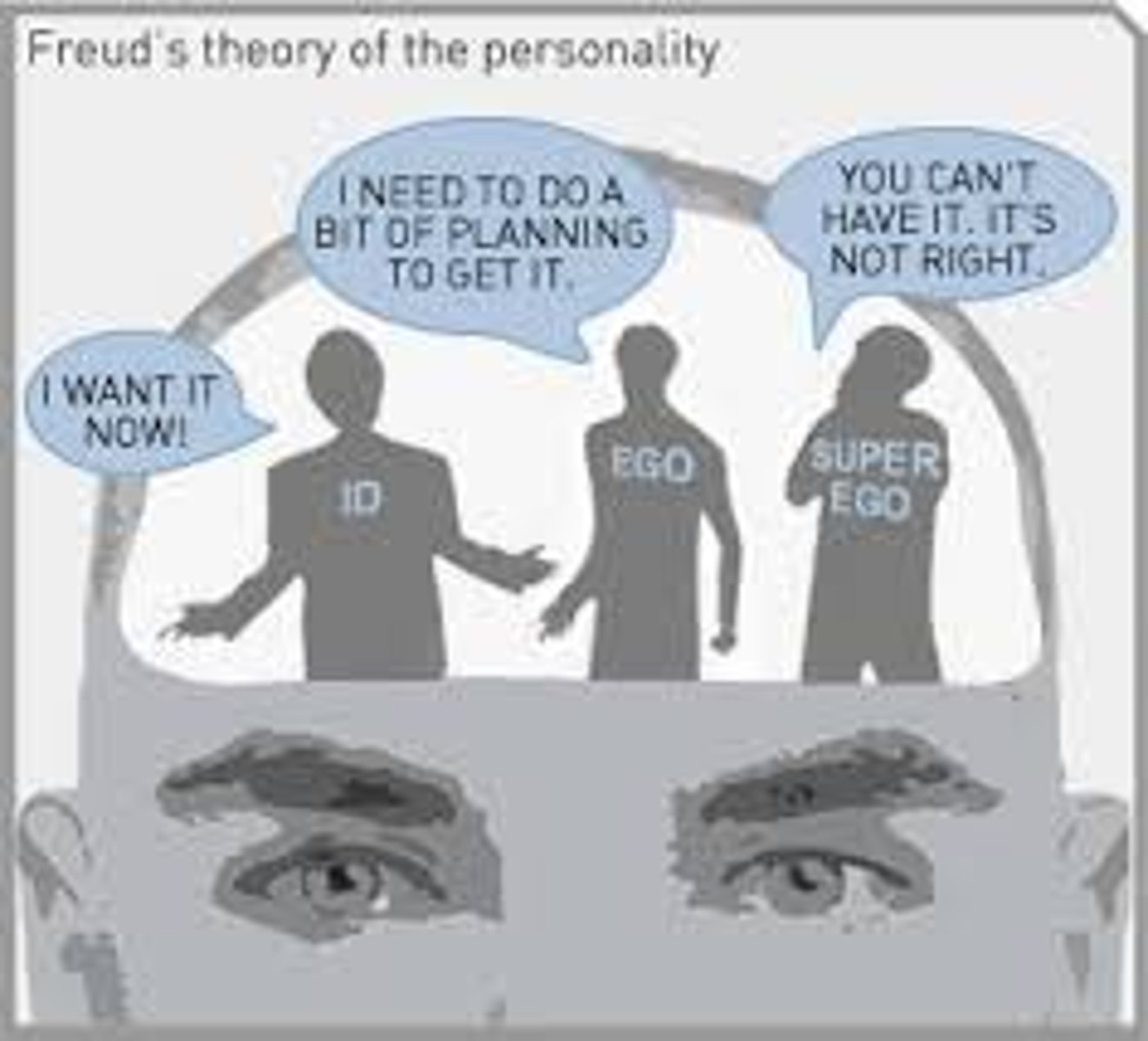Psychodynamic approach to explaining offending behaviour
1/12
There's no tags or description
Looks like no tags are added yet.
Name | Mastery | Learn | Test | Matching | Spaced |
|---|
No study sessions yet.
13 Terms
Psychodynamic approach to explaining offending behaviour
= a group of theories influenced by Sigmund Freud which share the belief that unconscious conflicts
... rooted in early childhood and determined by interactions with parents, drive future ad criminal behaviour
psychodynamic explanations
1. the inadequate superego
2. the maternal deprivation theory
The Inadequate Superego
... superego + id + ego = tripartite structure of personality
The superego works on the morality principle
... it punished the ego for wrongdoing, and rewards it for moral behaviour

Blackburn (1993)
argues that if the superego is deficient or inadequate, criminal behaviour is inevitable as the ID is not properly controlled

3 types of inadequate superego
1. the weak superego
2. the deviant superego
3. the over-harsh superego
1. The weak superego
= the result of the absence of a same sex parents during the phallic stage
- The child cannot internalise a fully formed superego as there is no opportunity for identification
- This would make immoral or criminal behaviour more likely

2. The deviant superego
= the result of a child internalising a superego with immoral or deviant values
- If same sex parent is a criminal and the child internalises this, then the child is unlikely to associate guilt with wrongdoing
- This will lead to offending behaviour

3. The Over-harsh superego
= this considers the impact of a healthy and unhealthy superego
- A healthy superego is fair - it has rules but is also forgiving
- An over-harsh superego is excessively punitive and results in the individual being crippled by guilt and anxiety
- This may unconsciously drive the child to commit criminal acts, to satisfy the superegos overwhelming need for punishment

Maternal Deprivation Theory
One of the potential results of maternal deprivation theory = affectionless psychopathy
... characterised by a lack empathy, guilt, and compassion

Bolwby + affectionless psychopaths
Bowlby identified these people as more likely to engage in acts of delinquency and less likely to form stable and close relationships
... lack the necessary experience to do so as a result of the deprivation they have experienced
Infants deprived of a mother figure during the first early years of life would suffer severe and even permanent consequences, as it is a critical attachment period
A03 WEAKNESS - gender bias
P
A weakness of the psychodynamic explanation is that it has been criticised for being subject to gender bias.
EV
The Freudian theory suggests that girls have weaker superegos than boys, as they are under less pressure to identify with the same sex parent due to a lack of castration anxiety. However, males show more criminal behaviour than females, and the majority of criminals are male.
EX
This contradicts the prediction of the inadequate superego explanation as according to the psychodynamic approach males should be more moral, whereas statistics show that males commit more crime.
EXT
In addition to this, the psychodynamic explanation is based off of unconscious concepts which cannot be empirically tested. For example, the inadequate superego can only be judged on their face value rather than their scientific worth and is therefore regarded as pseudoscientific.
LB
This is a weakness of the psychodynamic explanation because it lowers its scientific credibility and suggests that it significantly lacks validity due to its lack of falsifiability.
A03 WEAKNESS - contradictory evidence
P
Many of the concepts outline by the psychodynamic approach contradict each other.
EV
There is very little evidence that children raised without a same sex parent are less law-abiding as adults, and the idea that criminal behaviour reflects on unconscious desire for punishment seems implausible as most offenders go to great lengths to conceal their crimes.
EX
This contradicts the weak superego argument and the over harsh superego argument as covering up a crime suggests that they want to avoid punishment.
EXT
It is also hard to establish a causal link between maternal deprivation and criminal behaviour. Lewis (1954_ interviewed 500 young people and found no reliable link between the 2, suggesting that maternal deprivation may be just one of a range of factors affecting the likelihood of criminal behaviour.
LB
This suggests that there are many other reasons that explain offending behaviour, such as genetic factors and the influence of other people which may be better explained by the biological and differential association explanation.
A03 WEAKNESS - methodological issues
P
There are also methodological issues with Bowlby's work.
EV
Rutter argued that Bowlby oversimplified this concept as many of the thieves he had studied had experienced a complete lack of attachment (privation) which may have been more damaging than deprivation from loss or separation from an attachment figure.
EX
Bowlby failed to distinguish between the two, and therefore it is possible that the different circumstances have different long-term effects which Bowlby overlooked.
EXT
Furthermore, Bowlby can be criticised for unrepresentative sampling and poor control group matching, whilst also having research bias as his preconceptions may have influenced the response on his interviewees, all of which reduce the study's validity.
LB
Consequently, the ecological and face validity of maternal deprivation theory as an explanation for offending is threatened by these methodological problems, suggesting it is a weak explanation that cannot be relied on.